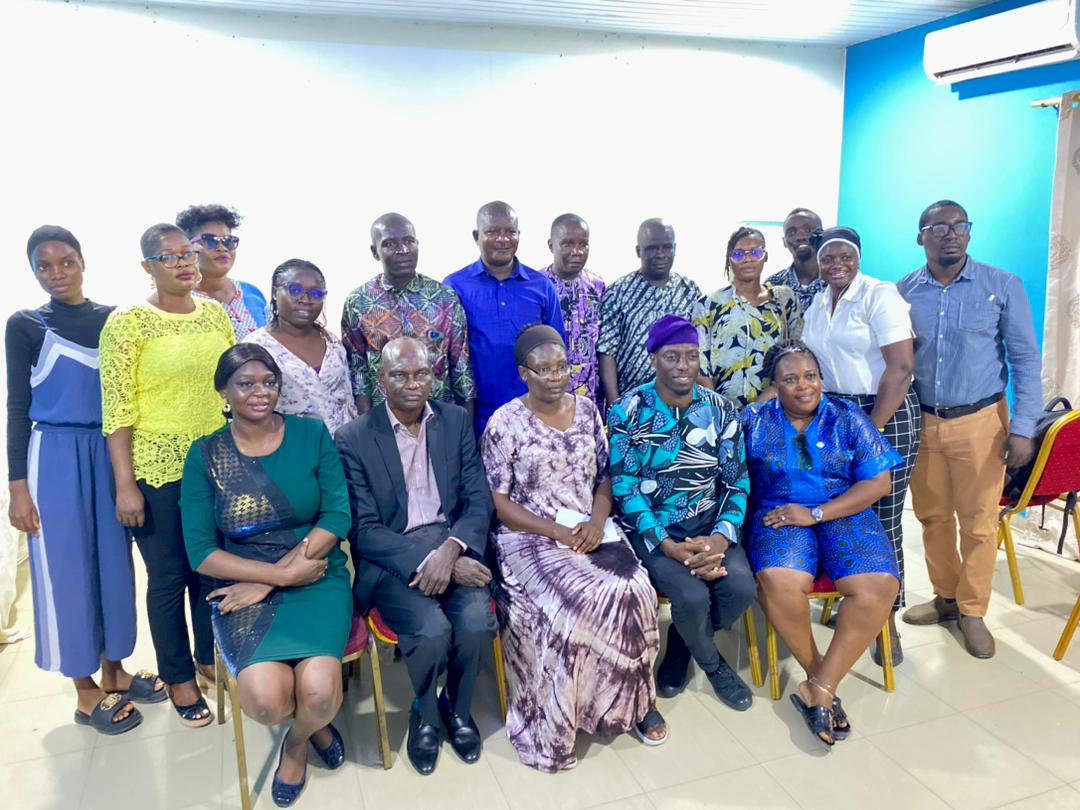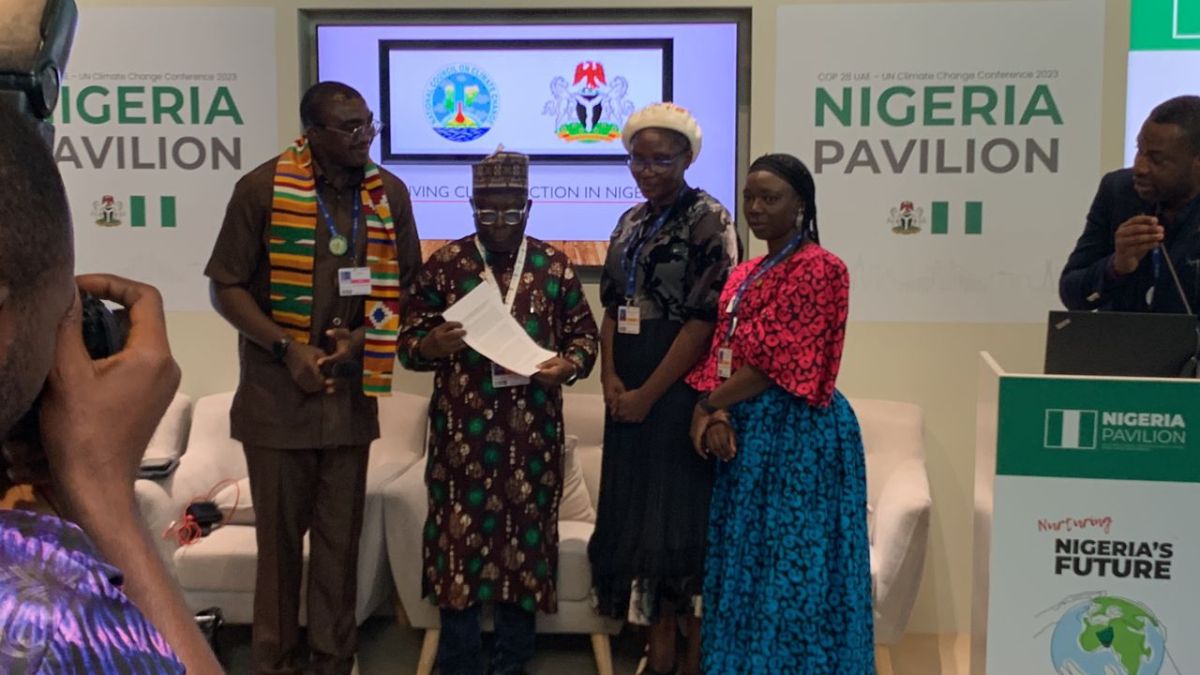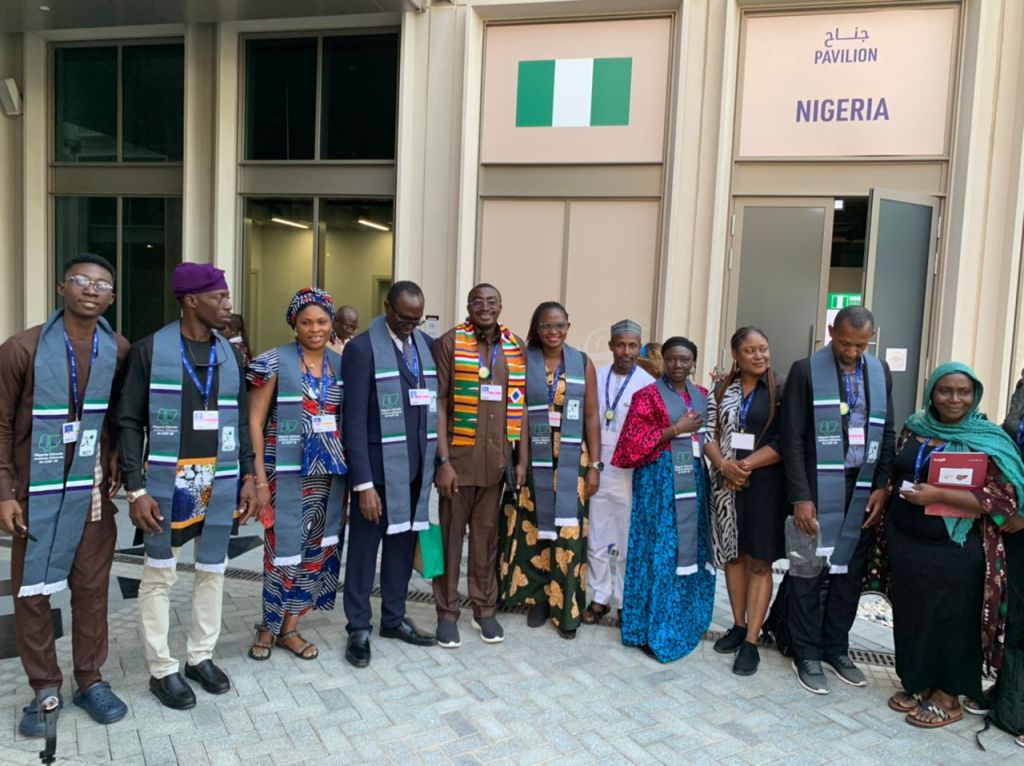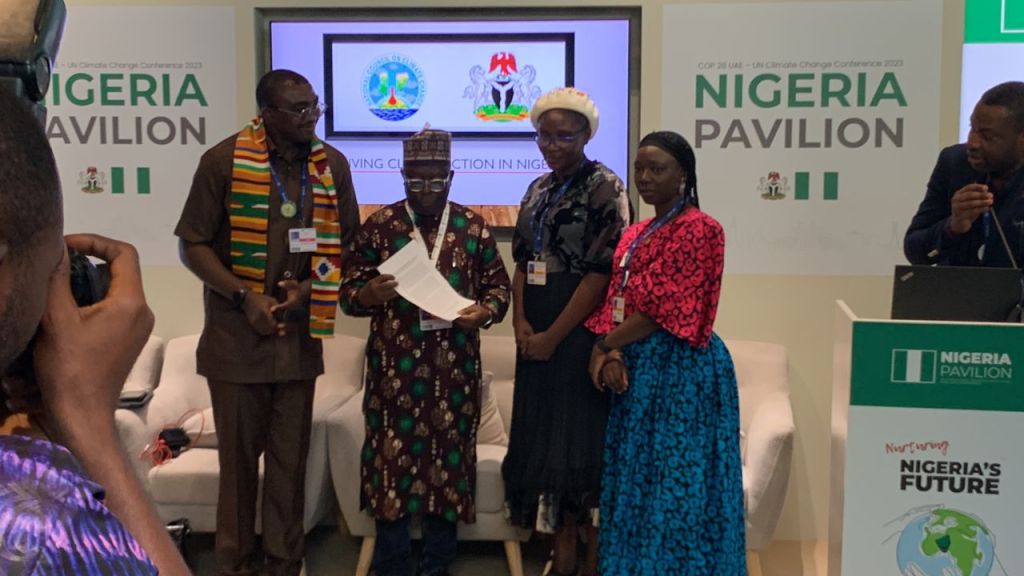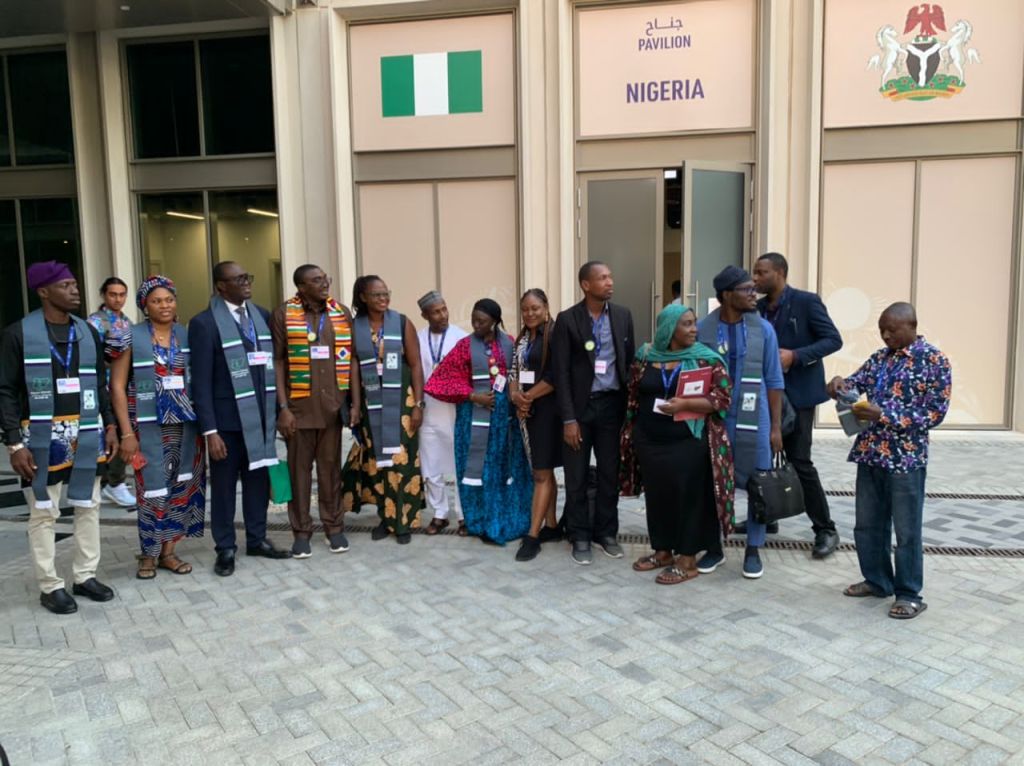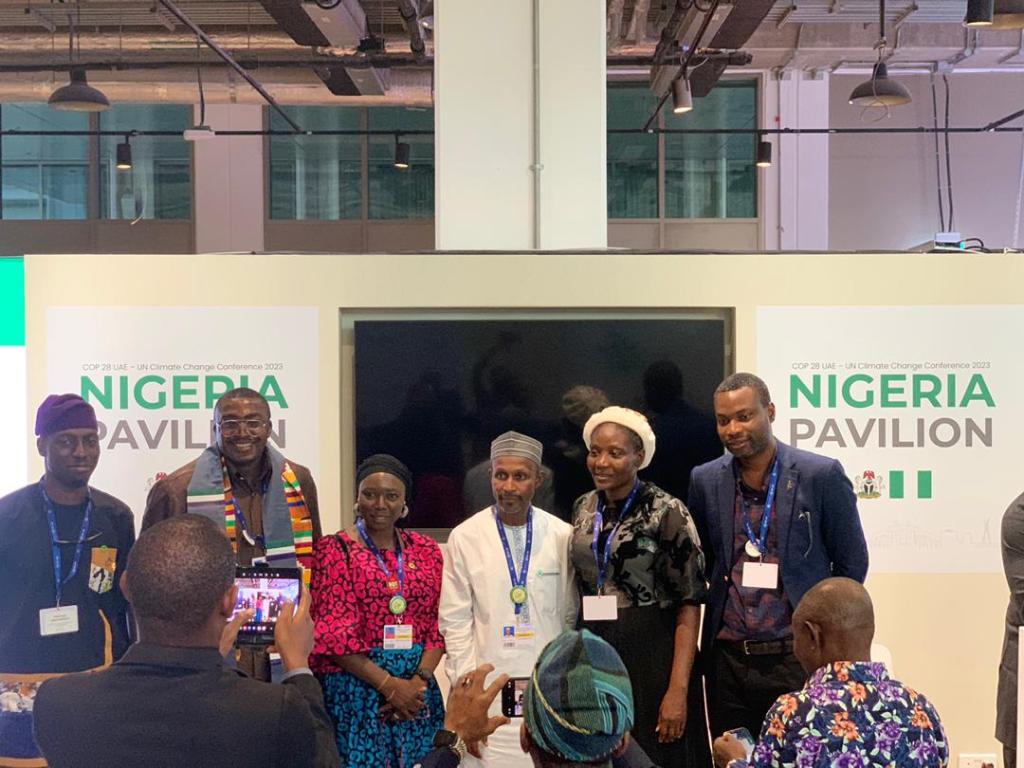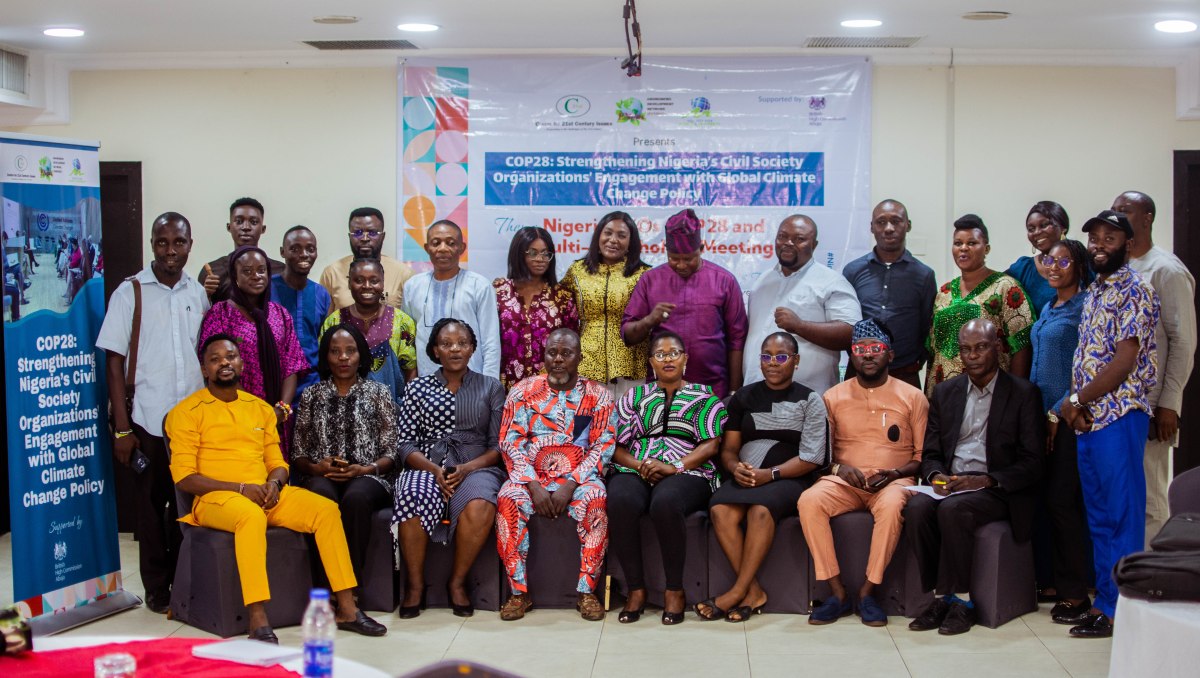INTRODUCTION
The Centre for 21st century Issues (C21st), Society for Planet and Prosperity and Evironews Development Network (EndNet) with support from Foreign Commonwealth and Development Office (FCDO), British High Commission in partnership with Nigeria Climate Justice Alliance mobilized the participation of over Two Hundred and Fifty Civil Society organizations in Nigeria to participate in COP28. The CSOs were organized and guided to make meaningful contributions to COP28 negotiations and participation in relevant side events that promote climate justice and collaborative efforts at ending the climate crisis.
NIGERIAN CSOs PARTICIPATION IN COP28
Nigerian civil society organizations (CSOs) played an active role in the participation of COP28, which took place from November 30th to December 12th. Throughout the conference, Nigerian CSOs closely followed the negotiations and actively engaged in the Global Day of Action on climate change, even until the final hours of COP28. They worked closely with relevant actors, including, International NGOs Development Partners and representatives from developing countries such as the African Group of Negotiators, to ensure that the decisions made at COP28 were ambitious and included critical considerations raised by those who are most affected by climate change in developing countries. They advocated for the delivery of essential financial support to address the impacts of climate change and demanded ambitious outcomes from COP28 that align with the 1.5-degree temperature goal
The participation of Nigerian CSOs in COP28 helped give a voice to those communities and regions that are most vulnerable to climate change. They contributed to the collective efforts of non-state actors and negotiators in calling for ambitious and equitable climate action that considers the unique challenges faced by developing countries.
OVERREACHING COMMENTS ON COP28 DECISIONS AND NIGERIA’S PARTICIPATION
The Nigerian civil society organizations (CSOs) welcomed the final decisions made at COP28, including the operationalization of loss and damage funds, Global Stocktake, Adaptation Goal, Climate Finance, the phase-out of fossil fuels, the tripling of renewable energy uptake, declarations on health and climate, declaration on sustainable agriculture, resilient food systems and climate action, just transition, among others. These decisions were seen as positive steps towards addressing climate change.
The Nigerian CSOs now urge parties to quickly translate these decisions into concrete climate actions on the ground, ensuring that those most impacted by climate change have a chance to survive. While acknowledging the financial pledges made during COP28 across various negotiation streams, the CSOs recognized that the current level of pledges is insufficient to effectively respond to climate change. They call on developed country parties to increase their financial commitments and promptly fulfill their pledges to accelerate climate action on the ground.
The Nigerian CSOs firmly believe that the strength of the COP28 decisions lies in the consistent and continuous actions taken by parties to implement these decisions and deliver on their financial commitments. They emphasize the importance of immediate action and urge all relevant stakeholders to prioritize implementation to effectively address the climate crisis.
Nigeria’s civil society organizations (CSOs) appreciate the commitment of Nigeria’s Government in participating actively in COP28. We commend the Nigerian team, led by the president and state governors, for adopting a result-oriented approach in mobilizing climate finance and engaging in bilateral negotiations to garner support for climate action in Nigeria. Additionally, we strongly urge the Nigerian Government to maintain its crucial leadership and political will in the sphere of climate governance. By doing so, Nigeria can create an enabling environment for multi-sector collaboration, which is essential for effective implementation of climate initiatives within the country.
.
IMPLICATIONS OF FOSSIL FUEL PHASE OUT FOR NIGERIA
The Nigerian civil society organizations (CSOs) are acutely aware of the implications of the fossil fuel phase-out for Nigeria and the urgent need to transition to renewable energy sources. As one of Africa’s largest oil producers, Nigeria faces unique challenges and opportunities in navigating this transition.
Nigeria has long relied on oil revenues, which comprise a significant portion of its GDP. Therefore, Nigeria must carefully balance the goal of sustaining its economy while divesting from fossil fuels. This requires comprehensive planning and a multi-faceted approach. However, the phase-out of fossil fuels also presents an opportunity for economic diversification. Nigeria can shift its focus towards renewable energy, especially with the recent removal of fuel subsidies. The launch of Nigeria’s Long-Term Mitigation and Low Carbon Development Strategy demonstrates the country’s careful planning for divestment from fossil fuels. These strategies provide a framework for fostering public-private collaborations, which can attract necessary financial resources, expertise, and technological advancements for a successful transition.
Through the implementation of the Long-Term Mitigation and Low Carbon Development Strategy, Nigeria can attract investment in solar, wind, and hydroelectric power sectors. This will help build a more resilient economy, create employment opportunities, protect the environment, and enhance the well-being of its citizens. Transitioning to renewable energy sources is not only crucial for Nigeria’s long-term economic stability but also essential for addressing climate change on a global scale.
The phase-out of fossil fuels also underscores the importance of intensifying nature-based solutions to address climate change impacts. Solutions such as reforestation, afforestation, sustainable agriculture, agroforestry, and sustainable land management can effectively tackle various environmental challenges and mitigate climate impacts, while offering multiple benefits to communities and biodiversity to build a resilient future for all.
It is important to note that the fossil fuel phase-out is part of a just transition, which requires adequate financing. Nigerian CSOs call upon development partners, multilateral development banks, and climate finance institutions to support Nigeria in its transition by providing the necessary financial resources to navigate this transition successfully. By receiving support, Nigeria can achieve a just transition that enhances sustainable development and promotes climate resilience.
THE ROLE OF CIVIL SOCIETY
As CSOs we are well aware of our role in ensuring the implementation of COP28 decision in Nigeria. We will work with relevant stakeholders to raise awareness about the environmental, social, and economic implications of fossil fuels phase out, the benefits of renewable energy uptake and other critical COP28 decisions and urge government to domesticate the decisions as appropriate.
We will monitor the actions of government and corporations to ensure that they are taking concrete steps towards incorporating COP28 decisions in their operations as appropriate. We will push for transparency, adherence to climate commitments, implementation of renewable energy policies, enforcement of environmental regulations and the reduction of harmful practices associated with fossil fuel exploration.
DESTRUCTION OF URBAN FOREST AT AGODI GARDENS IN IBADAN
As climate focused CSOs, we are totally against the destruction of the Agodi Gardens in Ibadan by the Governor Seyi Makinde led Oyo State Government.
We condemn this wanton destruction of our common heritage. We consider the development regrettable and highly unacceptable.
The UN Biodiversity had declared this decade as one for Ecosytems Restoration, and we consider the destruction of trees that have been standing for decades as going against the convention Nigeria has signed unto.
Destroying such a very important habitat in a big city like Ibadan goes against every known norm of living in harmony with nature. While other cities are bringing back greenery into their space for the health benefits, climate change mitigation and environmental restoration, it is regrettable that the Oyo State Government is doing the exact opposite.
We call on Governor Seyi Makinde to urgently halt this act of environmental degradation.
LOOKING AHEAD
Nigerian CSOs will Continue follow the Climate change negotiations and other follow up meetings at the international and regional level to implement COP28 decisions. A COP28 Lessons learnt meeting will be convened sometime in January 2024 to share critical lessons from COP28 and capture feedbacks from relevant stakeholders to improve on CSOs participation in COPs.
CONCLUSION
Over the years, Nigerian civil society organizations (CSOs) have been actively involved in addressing climate change issues at all levels. Moving forward, we remain committed to fulfilling our role by advocating for the voices of the underprivileged, marginalized groups, women, and youth to be heard and considered in climate change responses. We understand the importance of inclusivity and will strive to ensure that the concerns and perspectives of these vulnerable communities are effectively integrated into climate actions and policies.
Thank you for your attention
Titilope Ngozi Akosa – Executive Director Centre for 21st century Issues
For the convening Organizations
